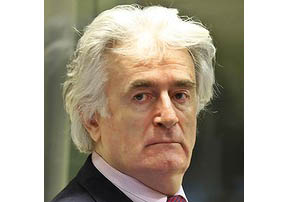‘I had nothing to do with it’, Karadzic tells war crimes tribunal
March 4, 2010 12:47 am
He is accused of masterminding the worst crimes in
The bombastic warlord associated more than anyone else with the Bosnian bloodbath and the pogroms of “ethnic cleansing” was, it transpires, all along the heroic Vaclav Havel of the Balkans.
It is almost 15 years since the end of the war in
In a four-hour soliloquy behind bulletproof glass at the International Criminal Tribunal for the former Yugoslavia in The Hague on Monday, the 64-year-old for the first time laid out his version of what happened in the 1992-95 conflict. Predictably, he rubbished the charges against him.
“They’re trying to convict us for something we never did,” he said. “There should have been no indictment against me in the first place … there is no Serb responsibility.”
The record strongly suggests otherwise. Dozens of books have
been written about the bloodshed in
A solid body of case law has been established, creating
juridical facts such as that what happened in Srebrenica in eastern
But Karadzic was having none of it. Rather, he bent over backwards repeatedly to save a country he is widely seen as having destroyed.
“The Serbs tried to defend themselves by making endless
concessions,” he declared. “We had five conferences and five peace plans. I,
the accused, agreed to four of them … There were 12 ceasefires in
In the autobiography he told the court, Karadzic was a reluctant politician with no ambition to be a leader, purely a “servant” of his people. He tried self-deprecation, but occasionally slipped up. “I don´t want to defend myself by saying that I was not important.”
Frequently he shifted into a third-person narrative as if talking about someone else. “Karadzic had been a dissident since 1968,” he said.
In a dark suit and white shirt, playing professorially with his spectacles and constantly rummaging through his shock of silver hair, Karadzic was confident and combative. Unlike many of his Serb co-defendants, he was also courteous, referring to the panel of three judges as Your Excellency and his poker-faced prosecutor, Alan Tieger, as “my respected adversary”. There was no sneering, no theatrics, no attempt to disrupt the proceedings.
But for many of those watching and listening to the Karadzic narrative, the former Bosnian Serb leader was from another planet.
While dismissing the charges against him, he failed to address any of the specific 11 counts, which range from the mass murder at Srebrenica to the 44-month siege of Sarajevo carried out by forces under his command; from the hostage-taking of more than 200 UN soldiers to the mini-gulag of camps his subordinates erected in the summer of 1992 in which thousands of Bosnian Muslims died.
The latter brought a brazen denial. The Muslim and Croat
inmates of Trnopolje camp in the summer of 1992 near the purged town of
The lengthy performance - Karadzic is defending himself with the help of legal assistants - was a long history lecture dwelling on the perennial victimhood of the Serbs, with the villains ubiquitous and formidable: Bosnian Muslim jihadists, Croatian fascists, the Turks reassembling an Ottoman empire, the Germans victoriously completing in 1991 what they started in 1941 with the Nazi occupation of Yugoslavia, NATO, the Americans, and the Vatican.
“I stand here before you not to defend the mere mortal that I am, but to defend the greatness of a small nation in Bosnia-Herzegovina … I will defend that nation of ours and their cause, which is just and holy,” Karadzic declaimed.
That may play well with the television audience back home in
a
What Karadzic and his cohorts were stopping was the “Green
Transversal” - the alleged Bosnian Muslim role helping to establish an Islamist
caliphate from “the Great Wall of China to the
For veteran Balkan-watchers, it was a blast from the past, a rerun of the paranoia and propaganda that was the nightly staple diet on Serbian state television throughout the 1990s.
Karadzic was on the run for 13 years until apprehended on a
He boycotted the opening of his trial in October last year and has repeatedly delayed the proceedings, rejecting defence lawyers and maintaining he needs more time to prepare and wade through the mountains of evidence.
But this week he has been methodical and well-prepared, peppering his arguments with PowerPoint projections of TV clips, documentary footage and archive material.
When the trial opened with a Karadzic boycott, the court
heard a tape with the defendant predicting that the forces then under his
control would turn the Bosnian capital,
On Monday, he averred that “the Serbs wanted to live with the Muslims, but not under the Muslims”.
“They wanted Islamic fundamentalism from 1991-95,” he told the court. “That’s what they wanted then. That’s what they want now.”
He, by contrast, wanted to turn
On Tuesday, Karadzic used his second day in the dock to pour
further scorn on allegations of genocide and war crimes. Karadzic insisted that
the Serbs could not be held accountable for the four-year siege of
“They shelled their own people and killed their own people
from snipers,” he said. Two infamous bombings of a
Karadzic also claimed that the killing of more than 7000
Muslim men and boys at Srebrenica in 1995, described by UN prosecutors as the
worst atrocity in
“It is going to be easy for me to prove that I had nothing to do with it,” he said. “It is a myth.”
Karadzic is accused of personal responsibility for Srebrenica under a genocide indictment. Last November, prosecutors presented evidence showing that “the only regret he had about the entire operation was that some Muslim men got away”.
The trial has been adjourned again pending an appeal by
Karadzic for more time to prepare his defence. - (The Age,












